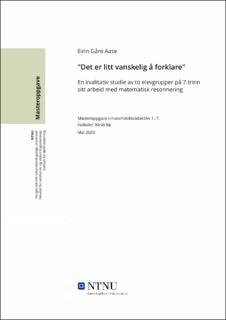| dc.contributor.advisor | Rø, Kirsti | |
| dc.contributor.author | Aase, Eirin Gåre | |
| dc.date.accessioned | 2021-09-28T17:46:14Z | |
| dc.date.available | 2021-09-28T17:46:14Z | |
| dc.date.issued | 2020 | |
| dc.identifier | no.ntnu:inspera:55578012:21808504 | |
| dc.identifier.uri | https://hdl.handle.net/11250/2784873 | |
| dc.description.abstract | Denne studien har undersøkt matematisk resonnering i barneskolen, der formålet har vært å bidra med kunnskap om hvordan elever på 7.trinn arbeider med og samarbeider om resonneringsaktiviteter i matematikk. Denne kunnskapen har lagt grunnlag for refleksjoner rundt hva matematisk resonnering kan bety og være i barneskolen, og hvilke utfordringer elevene møter. Studiens forskningsspørsmål er: Hva kjennetegner to elevgruppers deltakelse i en diskursiv aktivitet med matematisk resonnering?
Studien har gjennom en kvalitativ tilnærming brukt deltakende observasjon som metode for datainnsamling. To elevgrupper på henholdsvis tre og fire elever har blitt observert i samarbeid om oppgaver knyttet til generalisert aritmetikk i hundrerkartet. Datainnsamlingen ble gjennomført som gruppediskusjoner, der deltakende observatør kun stilte spørsmål og fulgte opp elevutsagn. Datamaterialet ble analysert ved hjelp av tematisk analyse med induktiv tilnærming, og åpen koding. Analyseverktøyet består av tre ulike teoretiske rammeverk: en modell for matematisk resonnering i skolen, et analytisk rammeverk for argumenters struktur og et rammeverk for elevers deltakelse i en matematisk diskurs. Modellen som ble benyttet har grunnlag i en bred betydning av matematisk resonnering, og inkluderer både et prosessaspekt og et strukturaspekt. Resonneringsprosessene er eksemplifisering, generalisering, formulering av hypoteser, identifisering av mønster, sammenligning, klassifisering, begrunnelse, bevis og formelle bevis. Strukturaspektet inkluderer deduksjon, induksjon og abduksjon. Det analytiske rammeverket for argumenter strukturerer en sammenfatning av elevenes utsagn i resonneringsprosessen etter data, konklusjon, hjemmel og ryggdekning. Den overordnede rammen for studien tar utgangspunkt i et sosiokulturelt syn på læring som deltakelse, og det er elevenes deltakelse i en diskursiv aktivitet med matematisk resonnering som er analysert.
Resultatene fra studien viser ulike kjennetegn på elevenes deltakelse i den diskursive aktiviteten med matematisk resonnering. Først og fremst framsatte elevene mange hypoteser, hvorav kun noen få ble begrunnet. Elevene hadde en utstrakt bruk av eksempler, der eksemplene støttet resonneringsprosessene sammenligning, generalisering, formulering av hypoteser og begrunnelser. I begge elevgruppene ble det gitt begrunnelser, i form av empiriske argument og forklaringer som kunne vært videre utarbeidet til generisk argument. Elevene deltok dessuten i det sosiale samspillet gjennom å inkludere hverandre, bekrefte og uttrykke uenighet. Resultatene fra studien indikerer at elevene ikke opplevde behov for å begrunne hypotesene sine og at de møtte på utfordringer i forsøket på å begrunne. De hadde en eksempelbruk som delvis var produktiv, og deres sosiale samspill bidro tilsynelatende til progresjon i deres matematiske diskusjoner. Resultatene viser at elevene kan delta i en diskursiv aktivitet med matematisk resonnering, og legger grunnlag for refleksjoner rundt didaktiske implikasjoner. | |
| dc.description.abstract | This study has investigated mathematical reasoning in primary school, with the purpose of contributing to knowledge about how pupils in 7th grade work with and collaborate on reasoning activities in mathematics. This knowledge has provided a basis for reflections on what mathematical reasoning can be, as well as the meaning of it in primary school, and the challenges pupils experience in their work. The research question for this study is: What characterizes the participation of two groups of pupils in a discursive activity of mathematical reasoning?
Through a qualitative approach, the study has used participant observation as a method for data collection. Two groups of pupils of three and four pupils, respectively, have been observed in collaboration on tasks related to generalized arithmetic in the hundreds chart. The data collection was conducted as group discussions, where the participating observer was restricted to ask questions and follow up pupils utterances. Data was analyzed using thematic analysis with an inductive approach and through open coding. The analysis tool consists of three theoretical frameworks: a model of mathematical reasoning for school mathematics, an analytic framework for the structure of arguments and a framework for pupils participation in a mathematical discourse. The model is built on a broad meaning of mathematical reasoning, including both a process aspect and a structural aspect. The reasoning processes are exemplifying, generalizing, conjecturing, identifying a pattern, comparing, classifying, justifying, proving and formal proving. The structural aspect includes deduction, induction and abduction. The analytic framework for the arguments structures a set of pupils statements from the reasoning processes by data, claim, warrant and backing. The main theoretical framework is based on a sociocultural perspective on learning as participation, and it is the pupils’ participation in a discursive activity with mathematical reasoning that has been analyzed.
The results of the study show different characteristics of the pupils participation in the discursive activity of mathematical reasoning. First, the pupils formulated a lot of hypotheses, of which only a few were justified. The pupils had an extensive use of examples, where the examples supported the reasoning processes of comparing, generalizing, conjecturing and justifying. Both groups produced arguments, some empirical arguments and some explanations that had potential for being further developed into generic arguments. The pupils also participated in the social interaction by including each other, confirming and expressing disagreement. Results indicate that pupils saw no need to justify their hypotheses and that they encountered challenges in their attempts to justify. They had an example use that were partially productive, and their social interaction apparently contributed to progression in their mathematical discussions. The results show that pupils can participate in a discursive activity with mathematical reasoning, and provide a basis for reflections on didactical implications. | |
| dc.language | | |
| dc.publisher | NTNU | |
| dc.title | "Det er litt vanskelig å forklare": En kvalitativ studie av to elevgrupper på 7.trinn sitt arbeid med matematisk resonnering | |
| dc.type | Master thesis | |
